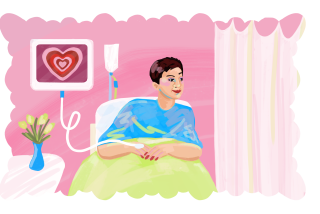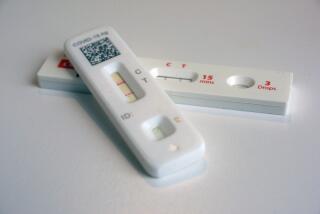Waiting for the AIDS Test, She Figures It’s Better to Know
I am a 41-year-old professional woman, divorced, with two small children. Yesterday I went to a county-operated health clinic and had my blood drawn for the AIDS antibody test. I have to wait two weeks for the results.
I grew up in sexually permissive times, and my sexual behavior has always been more typically male than female. I don’t need emotional involvement with my sexual partners. Some of them I really like as people, but with most it has been just curiosity. I don’t want to spend the night with them and I don’t want to have to figure out what to do with them the next morning.
The numbers didn’t used to bother me. But one day early last year I got panicky. I had recently been to bed with a kid of 21 or 22 who had a male roommate. Could he be bisexual? Then I thought of another recent partner, a surgeon. He had told me of a race he had with a colleague, on which of them would be the first to have sex with 1,000 women. My doctor won. I fought to keep myself calm.
By summer, my behavior hadn’t changed. I had unprotected sex with six or seven different men. Two were married; I felt a little better about them. But there were two who were distinctly “new wave” types; they gave me some serious concern. During the winter I had sex only a few times, with people I knew. But amazingly, it was still unprotected. Once, as I was about to get into bed with an old friend, I asked if he had a condom. He said he thought he had one in his car. He went out to look and came back empty-handed. We proceeded anyway.
Around six months ago the numbers began to sink in: I’ve been to bed with lots of men. They in turn have been with lots of women. Did any of the men patronize prostitutes, wittingly or unwittingly? Intravenous drug users? Women who’d had contacts with bisexual or homosexual men? A person who has not been celibate or absolutely monogamous (partner included) could become a basket case just calculating the odds.
So I began thinking about the blood test. A few of my sexually active friends--men and women--have thought about taking the test but decided that they really didn’t want to know. They don’t have kids. I want to know whether I’m going to see my children grow up. I want to make plans accordingly.
The West Hollywood county health clinic had a 14-week waiting list, but two other recently opened clinics, in South-Central and East Los Angeles, told me to come on in. At the clinic, the man at the window in the testing office asked for my code, which we had devised over the phone for anonymity. I gave it and he gave me some forms to fill out. The questions were few: no name, just sex, age, why I wanted to be tested. I checked “multiple sex partners.” The intake man came out of his office to start the 10-minute videotape about AIDS that all people in for the test must see. There were only a few people in the room: an elderly man, a middle-aged man, a young man and a middle-aged couple. The tape presentation was full of information, thoughtful, strong and frightening. It concluded with the female moderator asking us to examine whether we would be able to live with the results of the test if it was positive. She suggested that anyone who wasn’t ready to know should go home and think about it for a while longer. One of the older men got up and left.
The younger man turned to me and said “I want to know so I can deal with it. It’s better to know.” I agreed and was silently grateful that he was sitting there, because I’d been considering leaving, too. When my number was called, I said goodby to him and, as an afterthought, good luck. This would have been theater of the absurd if it hadn’t been so deadly earnest.
The counselor closed the door behind us. By now, I was pretty agitated, on the brink of crying. He reassured me: It was good that I came in, he said; it took a lot of courage, it was the right thing to do. I began to calm down. He gave me statistics that were comforting. Of the many tests they had done, only a few were positive. We talked about what the results would mean. He asked when my last unprotected contact was. I said three weeks. He said that meant, if my test this time is negative, I would need to come back in six months for another test. The antibodies that indicate the presence of the AIDS virus might not develop in three weeks; they could take as long as six months to show up. He gave me some condoms with the caution that they weren’t foolproof. Then he asked whether I had sex for business or pleasure. I looked at him quizzically, then the light dawned and I laughed. “For pleasure!”
I was turned over to a nurse, and when he swabbed my arm I asked about the sterility of the needles--a fine time for me to start worrying. As he drew the blood I asked whether he’d had the test. He said he hadn’t had the courage yet.
I left with a date and time to return to get the results. That has to be done in person. If the news is bad, I should tell all of my contacts. Can I do that?
All I can do now is wait and think about how to provide for my children if I die while they’re still young. I wonder how I could have gotten myself into this situation. The only answer is: All too easily.


